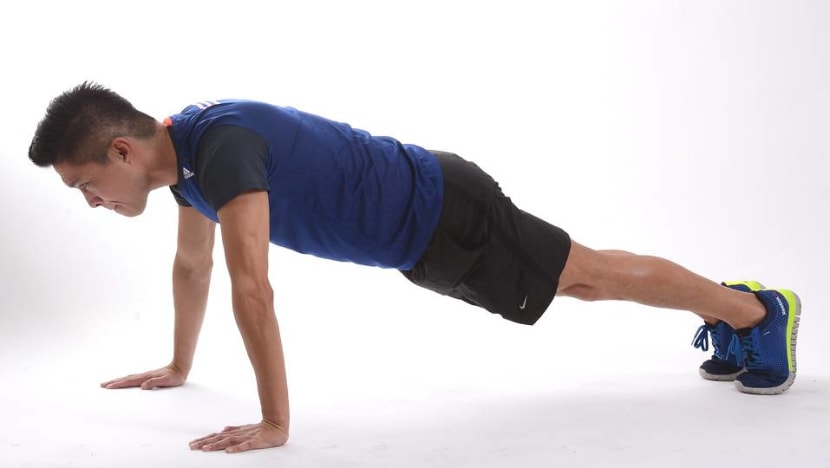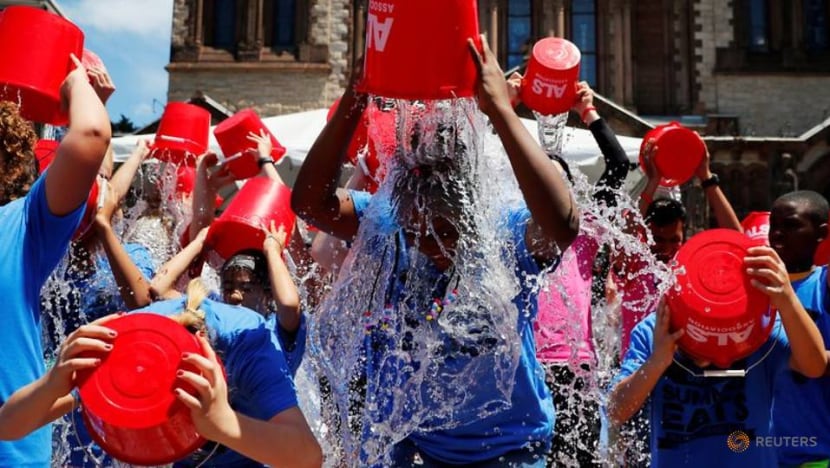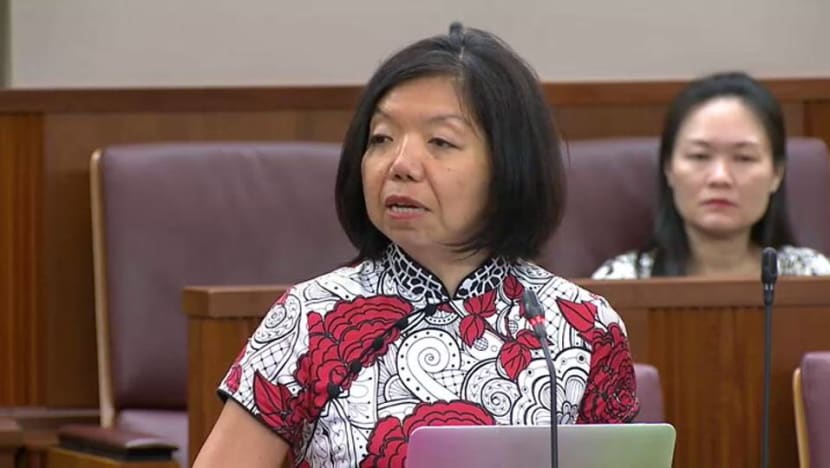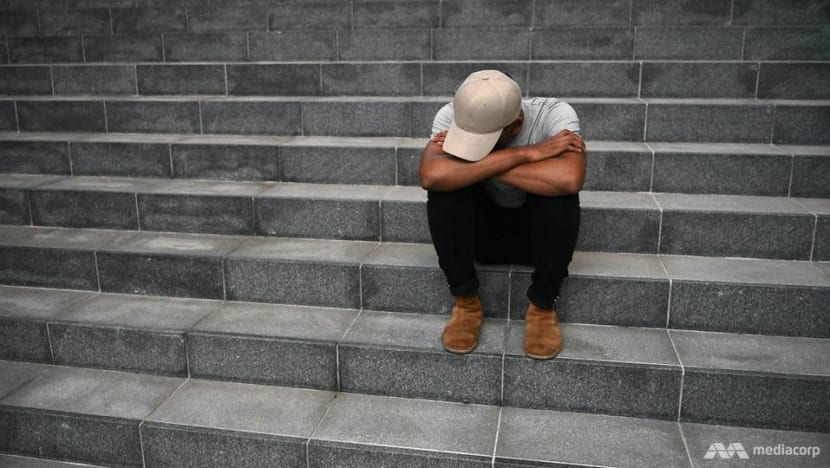commentary Commentary
Commentary: What good is doing push-ups for mental health?
The opportunity for real impact may be missing from the well-intentioned 25-day #pushupchallenge currently making its rounds in Singapore, says Anthea Ong.

(Photo: Pixabay/Keifit)
SINGAPORE: Remember the Ice Bucket Challenge which soaked the world in 2014? It was specific, accessible and fun, but also empathetic.
The act of pouring ice over oneself simulates the experience of muscle stiffness that people diagnosed with ALS - amyotrophic lateral sclerosis - feel. If you could not meet the challenge, you were asked to donate US$100 to the ALS Association.
Beyond awareness, the viral challenge also helped create a scientific breakthrough. It raised US$115 million - five times more funds than the previous year - allowing the Association to speed up research.
This in turn identified a new gene, NEK1, which contributes to the rare neurodegenerative disease.
This opportunity for real impact may be what is missing from the well-intentioned 25-day #pushupchallenge currently making its rounds in Singapore.
Aiming to “build awareness for anyone who is suffering through mental illness”, the challenge asks the participant to record doing 25 push-ups everyday for 25 days, and to nominate a different person each day.
DO PUSH-UPS COUNT?
Unfortunately, the very people that it attempts to support are not clear about how exactly it will help them or the larger mental health community.
A colleague from Hush TeaBar who lives with anxiety and depression told me she “cannot see the link at all.”
“So what if people can do push-ups? Does that make me feel less alone? No, it doesn't. Does it reduce suicide numbers? No, it doesn't. It just shows me that they're capable of toning their arms”, she said.

Another colleague from A Good Space, who attempted suicide a few years ago, was concerned that the challenge could trivialise the real work needed to create a more inclusive society for mental health.
He said: “What if people think, ‘oh after I do my push-ups, I have done my part’?"
In other words, the push-up challenge might be, as a friend who had an episode last year with depression put it pointedly, “well-meaning but tone deaf”.
This is especially since COVID-19 has illuminated long-existing mental health issues that demand urgent attention and concrete actions.
REAL ISSUES: HIGH TREATMENT COSTS AND SUICIDE NUMBERS
The affordability of mental healthcare is now further challenged in light of the economic crisis, with more affected, and for longer.
READ: Commentary: Burned out while working from home? You should check your work-life boundaries
READ: Commentary: Immobility during COVID-19 and its effects on our sleep, physical activity and well-being
A single mother I know who has to care for her young boy and elderly mother has had her salary first cut by 50 per cent and another recent reduction that left her with only 25 per cent of her original salary.
Her anxiety is protracted and intensifying yet she cannot afford to seek help.
Affordability also stood out as a predominant concern for two-thirds of the respondents to a public consultation my team of volunteers and I did in preparation for my Budget 2020 debates.
But the issues long predate the pandemic.
In 2016, a survey of 6,126 Singaporeans with mental health conditions by the Institute of Mental Health revealed 78.6 per cent had not sought treatment in the past 12 months, with 74.6 per cent of such respondents citing high costs as a reason.

Suicides are another alarming mental health issue that may be exacerbated by COVID-19.
Last year, Singapore recorded 400 suicides - more than one a day. According to the World Health Organisation, there are as many as 20 suicide attempts for every suicide and many times more suicide ideation per attempt.
A mother in her mid-40s jumped to her death from the top of the block next to mine two months ago. The tragedy happened fifty days after her only son died by suicide from the same spot on the first day of school re-opening in June.
I understand from an informal suicide support group that there were four deaths by suicide of young people within the first week of June alone.
VIRAL CHALLENGES CAN WORK
These problems are only too real, affecting people with mental health conditions. A viral challenge should be an excellent opportunity to - quite literally - “push up” actions that directly support such individuals, and make a real impact on the mental health community.
READ: Commentary: Expect higher levels of anxiety and depression when COVID-19 restrictions lift
READ: Commentary: Cyberbullying just keeps getting worse. Even COVID-19 hasn't dampened its spread
This is especially the case when the challenge counts people of influence, including Members of Parliament and celebrities, among its participants.
For example, we might mimic the success of the Ice Bucket Challenge and ask participants to push up or donate directly to community mental healthcare agencies, so they can expand their capacity as well as provide subsidised or free treatment and support for those who are unwell.
For those keen to see structural changes, they could use the challenge as a platform to call for an upward adjustment of Medisave and MediShield to be used for psychiatric treatments, to be on par with other medical treatments.

We could also take a leaf from other push-up challenges around the world to break the silence on suicides here in Singapore.
In 2013, a viral challenge called #22KILL saw celebrities like Dwayne Johnson, Chris Pratt and Chris Evans posting videos of themselves doing 22 push-ups every day for 22 consecutive days.
It highlighted an alarming statistic of 22 veteran suicides everyday and was a call to honour the sacrifices of those who have served and yet returned mentally broken.
READ: Commentary: We declare a goal of ending mental health stigma yet viciously mock the woman at Shunfu Market
READ: Commentary: Our approach to mental health needs to change. COVID-19 will force us to
In fact, I believe this was the first-ever viral push-up challenge for mental health which might assure my colleague from Hush that push-ups were appropriate and intuitive for this specific challenge, given the symbol for health and the military context.
Unfortunately, this link between push-ups and mental health certainly got lost along the way.
Similarly, Australia launched a #pushforbetter national challenge for 21 days from May 11-31 this year.
The aim was for individuals and teams to complete 3,046 push ups to highlight the devastating number of Australian lives lost to suicide in 2018. The challenge also raised over A$5 million for headspace, a National Youth Mental Health Foundation.
Apart from highlighting the alarming number of suicides, many suicide-related groups, such as Caring for Life and Samaritans of Singapore, do important work and could benefit from direct support from participants of the challenge.
Or the Please Stay Movement, an advocacy group of suicide-bereaved parents, who recently urged the Government to establish a national suicide prevention office.
This follows a similar call I made in Parliament for a national strategy towards zero suicides, so as to give the cause a national profile and adequate resourcing.
COMMIT TO PERSONAL CHANGE AND REACH OUT
Beyond calling for changes to the affordability of mental healthcare or advocating for suicide prevention, one of the most important things one can do is to start with oneself.
READ: Commentary: Immobility during COVID-19 and its effects on our sleep, physical activity and well-being
READ: Commentary: Did your relationship fail to survive COVID-19? Here’s how to move on
After all, we must be the change that we want to see in the world, as Mahatma Gandhi so wisely put it.
I had my own brush with depression 14 years ago from a broken heart, a broken marriage and a broken business leaving me with only S$16.
That night, awash with shame and despair, I even contemplated the distance between the windows of my 18th floor apartment and the ground below.
It seemed impossible then to get out of that deep dark place. I only managed to emerge because of the strong support system and inner resources I had, and still have.

Everybody deserves them but not everyone has them.
We are responsible for each other’s mental well-being. Studies have found that social support plays an important role in mental health or substance use problems.
For example, people who are clinically depressed report lower levels of social support than people who are not currently depressed. And the opposite is true: People who feel more connected to others have lower levels of anxiety and depression.
READ: Commentary: On social media, life amid coronavirus risks becoming a popularity contest
READ: Commentary: As therapy sessions move online, more may finally seek needed help
What personal change or action can we also commit to in order to make a difference?
How can we nudge each other through this viral challenge to reach out, to listen and to hold space for difficult conversations to support those who are struggling with mental health challenges?
What concrete steps can we take to provide the social support that could save someone we know from that downward slippery slope? Can we relate to how it feels to have mental health difficulties, without pouring ice over ourselves?
Like all viral challenges, this 25-day #pushupchallenge will pass one day. Sadly, the same cannot be said with certainty of the challenges of those who have to live with mental health conditions - and these numbers are increasing.
But we can make use of its current popularity far more effectively and intentionally, to ease the difficulties faced by the latter.
These specific calls to action improve affordability of mental healthcare, supporting suicide prevention as well as making that personal change for a more mental health-friendly and inclusive society.
With these aims, perhaps the person doing it would then make each push-up count, and truly uplift those who are actually struggling.
Anthea Ong is a former Nominated Member of Parliament, Social Entrepreneur (Hush TeaBar, A Good Space), Leadership Coach and Author of 50 Shades of Love.














